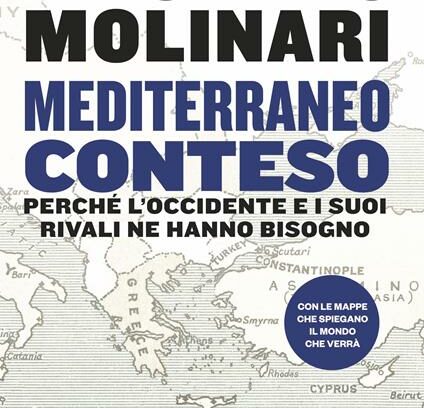The 5 conflicts in the Mediterranean

“Contested Mediterranean. Why the West and its rivals need it" by Maurizio Molinari (Rizzoli) read by Tullio Fazzolari
For the ancient Romans the Mediterranean was the "mare nostrum". They could rightfully call it that because they dominated all its coasts, had eliminated rival Carthage and defeated piracy. Since then, in practice, no one has ever had total control of the Mediterranean but everyone, from the Ottoman Empire to the British Empire, has tried to obtain it. If this is the story of past centuries, the news of recent years shows that the situation has worsened further. And to understand how serious it is, it is worth reading “Disputed Mediterranean. Why the West and its rivals need it” by Maurizio Molinari (Rizzoli, 320 pages, 22 euros). For the first time a book (or rather a geopolitical atlas) explains everything that is happening without limiting itself to the analysis of a single hotbed of tension and thus manages to give an integral vision of the problem.
There is often a shortsightedness that needs to be corrected in the mass media and in public opinion. Today, understandably, attention is focused on Gaza and the clashes between Israel and Hamas. Until yesterday we were only talking about Ukraine and before that Syria. In reality none of these wars are over. As Molinari explains, five conflicts are still ongoing in the Mediterranean area. The list of those who are fighting, from the Kurds to the Palestinians or the various Libyan factions, is impressive. But perhaps much more worrying is the number of states interested in controlling the Mediterranean. First of all, there are the three global superpowers. For various reasons, the United States has always maintained an operational fleet on this side of the Strait of Gibraltar. Putin's Russia continues the strategy of expansion beyond the Black Sea inaugurated by Tsar Peter the Great. And now even China sends its ships to the Mediterranean. But the list of states interested in what was the "mare nostrum" includes at least a dozen medium powers between Arab and European countries.
Molinari's in-depth analysis highlights multiple aspects that need to be taken into account. The first essential fact is that the Mediterranean area has become much larger than its classic geographical definition. And the maps contained in the book (using a method already tested in the previous book "The Return of the Empires") effectively explain how this happened. Tensions and conflicts from neighboring regions converge on the Mediterranean but the play of economic interests, especially in the energy sector, even reaches as far as the Gulf of Guinea. In fact, as Molinari writes, the Mediterranean has become "the strategic heart of the planet". The unpleasant feeling is that he is not only contested but also threatened. Terrorism, inequalities, other potential crisis areas, poorly managed migratory flows and so on do not leave too much room for optimism.
This is a machine translation from Italian language of a post published on Start Magazine at the URL https://www.startmag.it/mondo/i-5-conflitti-nel-mediterraneo/ on Sun, 26 Nov 2023 06:50:48 +0000.
